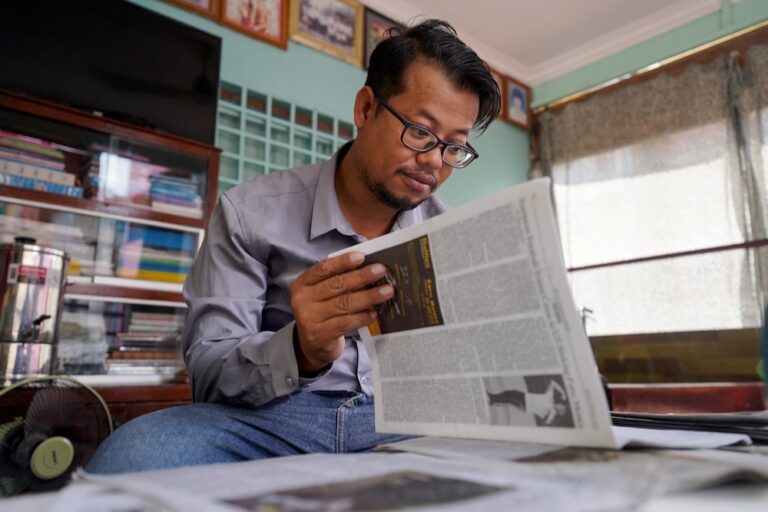(SEAPA/IFEX) – On 7 January 2006, two human rights officials were briefly detained in Takeo Province for organising, without the permission of provincial authorities, a signature campaign to free jailed human rights defenders and journalists, the Cambodia Center for Human Rights (CCHR) reported on 8 January. In what seems to be an incessant “witch-hunt” of […]
(SEAPA/IFEX) – On 7 January 2006, two human rights officials were briefly detained in Takeo Province for organising, without the permission of provincial authorities, a signature campaign to free jailed human rights defenders and journalists, the Cambodia Center for Human Rights (CCHR) reported on 8 January.
In what seems to be an incessant “witch-hunt” of critics of Prime Minister Hun Sen’s government, the provincial police arrested two CCHR officers who were encouraging villagers to sign the petition. The police also confiscated hundreds of signature campaign documents and, according to CCHR, took 300 thumbprints from people who wanted the human rights activists freed, ordering them not to sign the petition until the government grants the organisers a permit.
The two arrested human rights officers were released after the police interrogated them. The Cambodian Constitution guarantees people’s right to free expression, which includes the right to peaceful assembly. It is unclear why the organisers of the campaign need prior permission from the provincial authorities.
Despite this obstacle, the organisers vowed to continue with the campaign. According to CCHR spokesman Ou Virak, the signature drive campaign, which began on 5 January in the Angkor Borey district, was expected to gather 5,000 signatures or thumbprints expressing opposition to the government’s arrests. The campaign will also be used to convince Prime Minister Hun Sen, the National Assembly, the Senate and the King to release human rights workers jailed at the Prey Sar prison on defamation charges.
Opposition member Mua Sok Huar said that, after 5,000 signatures were obtained, they would also ask the Phnom Penh municipality to organise a public awareness campaign to educate the people about their civil and democratic rights.
The goal, according to Mua Sok Huar, is also to make government officials aware that the arrests will not put an end to people’s demands for freedom of speech.
The arrest of the CCHR officials took place despite mounting international pressure on the Cambodian government to stop abusing laws to silence its critics. At the end of 2005, CCHR director Kem Sokha and Cambodia Center Education of Law (CCEL) coordinator Yeng Virak were arrested in their offices and jailed for defamation over an anti-government banner displayed at the Human Rights Day celebration on 10 December. On 4 January 2006, Pa Nguon Teang, acting director of the CCHR, was arrested near the Cambodia-Laos border and later detained on the same charges as his superior.
These detentions form part of a crackdown launched by the Hun Sen government against its critics in October, to silence criticism of the government’s special border agreement with Vietnam.
Thus far, six human rights defenders and one journalist have been arrested and detained in Prey Sar prison on defamation charges.
Reacting to recent statements made by international rights groups and international aid donors, Minister of Information Khieu Kanharith insisted that the Cambodian government adheres to the principles of human rights and democracy, and that Cambodian citizens are allowed to criticise the government. He also cited the fact that there are more than 2,000 NGOs operating in the country and that, despite the arrest of its director, CCHR is still operating.


